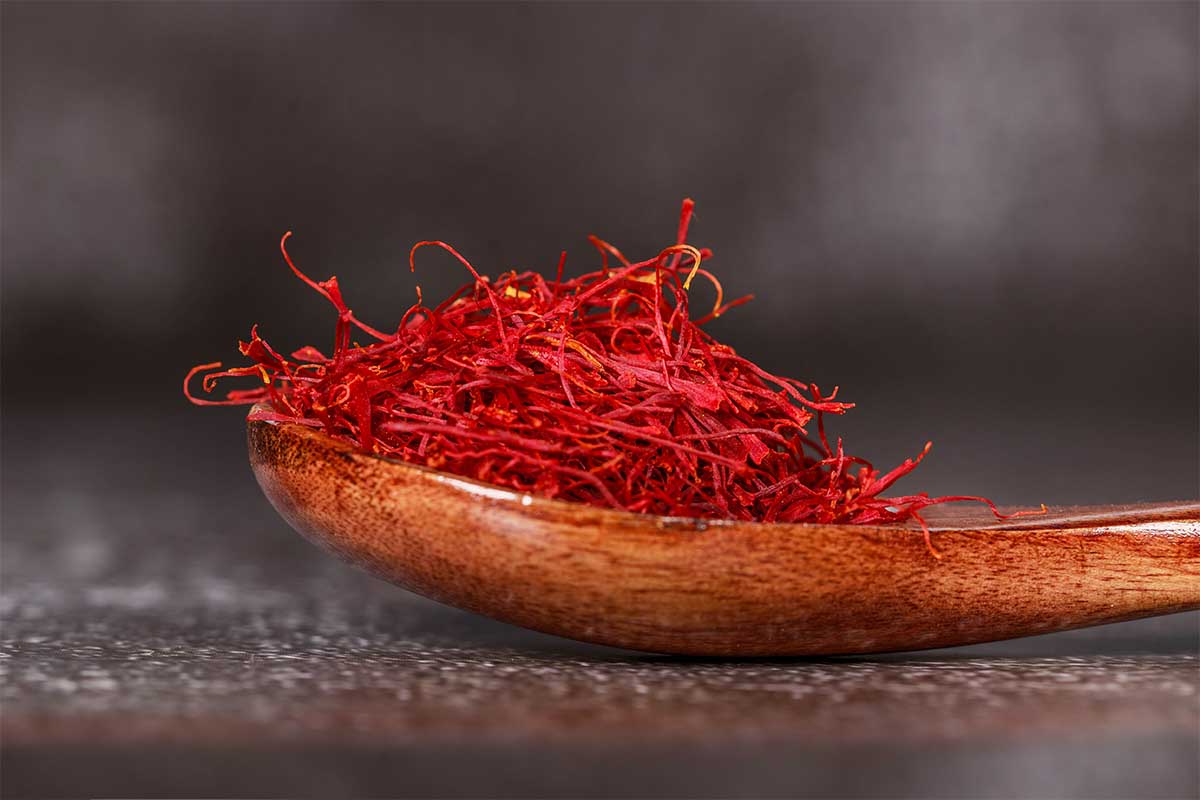Advertisement
10 Amazing Health Benefits of Saffron
How this ancient spice can keep you calm, happy, and healthy
Fact-Checked
This article has been written and fact-checked by experts in the field.

Alleviates depression
Easily recognized by its vivid hue and earthy aroma, saffron has been used medicinally around the world for more than 3,000 years. Today, science confirms saffron’s therapeutic potential for mental health and beyond. If saffron isn’t already in your spice cabinet or supplement drawer, you’ll likely want to add it after discovering these benefits.
 Saffron shows exciting promise as a natural mood booster for people with moderate depression. The spice’s active compounds influence serotonin and dopamine levels in the brain. These feel-good hormones help guide our brains toward positivity, offering relaxation and relief from stress. In an eight-week study, taking a daily saffron supplement helped 93 percent of mothers recover from symptoms of postpartum depression, while only 43 percent of mothers recovered without saffron.
Saffron shows exciting promise as a natural mood booster for people with moderate depression. The spice’s active compounds influence serotonin and dopamine levels in the brain. These feel-good hormones help guide our brains toward positivity, offering relaxation and relief from stress. In an eight-week study, taking a daily saffron supplement helped 93 percent of mothers recover from symptoms of postpartum depression, while only 43 percent of mothers recovered without saffron.
Calms anxiety
 If daily stress, anxiety, or nervousness is holding you back from your goals, try adding saffron to your routine. Saffron’s anti-inflammatory components have been shown to help tone down the body’s stress response. Researchers found that taking a single 30 mg dose of saffron extract helped keep men calm and lowered their levels of the stress hormone cortisol during a stress test.
If daily stress, anxiety, or nervousness is holding you back from your goals, try adding saffron to your routine. Saffron’s anti-inflammatory components have been shown to help tone down the body’s stress response. Researchers found that taking a single 30 mg dose of saffron extract helped keep men calm and lowered their levels of the stress hormone cortisol during a stress test.
Improves sleep
 A good night’s sleep sets the foundation for a vibrant and productive day ahead. In a month-long sleep study, poor sleepers who took saffron extract nightly before bed improved their quality of sleep by 24 percent and reduced insomnia symptoms by 16 percent. Experts suspect that saffron enhances non-REM sleep by calming the nervous system, balancing chemical messengers involved in the body’s sleep-wake cycle, and increasing melatonin levels.
A good night’s sleep sets the foundation for a vibrant and productive day ahead. In a month-long sleep study, poor sleepers who took saffron extract nightly before bed improved their quality of sleep by 24 percent and reduced insomnia symptoms by 16 percent. Experts suspect that saffron enhances non-REM sleep by calming the nervous system, balancing chemical messengers involved in the body’s sleep-wake cycle, and increasing melatonin levels.
Enhances memory
 Long-term stress changes areas of the brain involved in learning and memory. Saffron’s memory-enhancing properties stem from its key compound crocin, which passes through the blood-brain barrier to protect brain cells from oxidative stress, inflammation, and other stress-induced damage. In addition, taking saffron has been found to slow cognitive decline in Alzheimer’s disease patients as well as some standard prescription therapies.
Long-term stress changes areas of the brain involved in learning and memory. Saffron’s memory-enhancing properties stem from its key compound crocin, which passes through the blood-brain barrier to protect brain cells from oxidative stress, inflammation, and other stress-induced damage. In addition, taking saffron has been found to slow cognitive decline in Alzheimer’s disease patients as well as some standard prescription therapies.
Reduces PMS symptoms
 Saffron can not only perk up your mood when PMS leaves you feeling low, but also help reduce physical PMS symptoms like painful period cramps. A study with 18- to 27-year-old women found that taking saffron cut the severity of painful PMS cramping by more than half. Working as an antispasmodic, saffron relaxes smooth muscles in the uterus Saffron is also an anti-inflammatory found to be more effective for PMS than the over-the-counter anti-inflammatory used in the study.
Saffron can not only perk up your mood when PMS leaves you feeling low, but also help reduce physical PMS symptoms like painful period cramps. A study with 18- to 27-year-old women found that taking saffron cut the severity of painful PMS cramping by more than half. Working as an antispasmodic, saffron relaxes smooth muscles in the uterus Saffron is also an anti-inflammatory found to be more effective for PMS than the over-the-counter anti-inflammatory used in the study.
Supports cardiovascular health
 For generations, saffron has been used to promote cardiovascular health. Mediterranean populations, where saffron is commonly eaten, have notably lower rates of heart disease. Not only does saffron’s antioxidant and anti-inflammatory properties protect the arteries from harmful free radicals, but regular intake also lowers cholesterol. Saffron may also improve vital metabolic stats, like body mass index, waist size, and body fat, taking additional stress off the heart.
For generations, saffron has been used to promote cardiovascular health. Mediterranean populations, where saffron is commonly eaten, have notably lower rates of heart disease. Not only does saffron’s antioxidant and anti-inflammatory properties protect the arteries from harmful free radicals, but regular intake also lowers cholesterol. Saffron may also improve vital metabolic stats, like body mass index, waist size, and body fat, taking additional stress off the heart.
Protects the eyes
Advertisement
Carotenoids are the superstars of eye health—and saffron is a wonderful source. Crocin and crocetin, the carotenoids responsible for saffron’s rich hue, work alongside its flavonoids and other antioxidants to protect the retina from damaging light exposure and oxidative stress. Some studies suggest that saffron is an effective natural remedy for improving vision in people with age-related macular degeneration and glaucoma.
Boosts sex drive

Saffron was traditionally used in Persia and other cultures as an aphrodisiac. More recently, science has highlighted saffron as a gentle therapy for women’s sexual function and men’s erectile dysfunction. In one study, women experienced a 62 percent improvement in aspects of desire, lubrication, and satisfaction after taking saffron for six weeks. Experts suspect that saffron’s mood-boosting attributes are key to its aphrodisiac qualities.
Balances blood sugar

Saffron is becoming a sought-after therapy for balancing blood sugar. Clinical studies show that saffron and its key active compounds help lower blood sugar levels. Saffron’s anti-diabetic effects work partly by inhibiting certain enzymes, helping lower the absorption of carbohydrates from food. Saffron also helps control appetite, effectively curbing cravings that can lead to overeating sugary foods.
Fights oxidative stress

Saffron plays a pivotal role in the Mediterranean diet, an eating pattern renowned for promoting healthy aging and combating oxidative stress. Saffron’s abundant antioxidants bolster the body’s defense mechanisms, enhancing its ability to safeguard against many health conditions, spanning from asthma to cancer. Modern living exposes us to oxidative stress through pollutants, UV radiation, and emotional strain, making an antioxidant-rich diet increasingly vital for our overall well-being.






